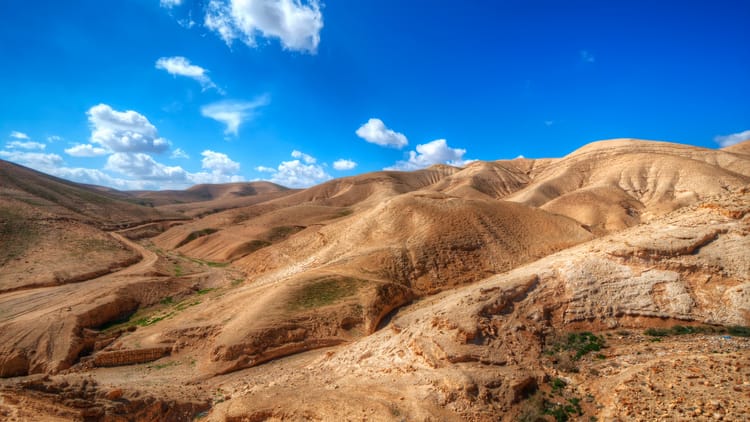God is Sovereign, Life is Hard (Psalm 90)

Big Idea: Let this crisis teach you that God is sovereign, life is hard, you are mortal — and that you can cry out to him.
Two weeks ago, my brother-in-law posted a message in our private family group:
Hey Family, I don’t want anyone to panic but I can tell you that most employers in North America and preparing for a month of quarantine. … We are most likely 2-4 weeks from a month long school and work force shut down but maybe just stock up on some water and non-perishable foods early this week. A month without school, commerce or utilities may be a 1/100 chance but we are making the choice to error on the side of caution.
We didn’t know what to make of his advice at the time, but he was dead right. This week, in the space of a few hours, everything changed. Everything was canceled. New restrictions are in place. Things will eventually return to normal, but things will look different for the next few months at the very least.
I’ve been comforted this week by examining how previous generations have reacted to pandemics. Here’s some of what I’ve learned:
- Martin Luther, in 1527, has taught me to take necessary precautions and then trust God as we serve others. “I shall ask God mercifully to protect us. Then I shall fumigate, help purify the air, administer medicine, and take it. I shall avoid persons and places where my presence is not needed in order not to become contaminated and thus perchance inflict and pollute others, and so cause their death as a result of my negligence … If my neighbor needs me, however, I shall not avoid place or person, but go freely, as stated above.”
- Francis Grimke, in 1918, taught me to ask what God could be teaching us through the pandemic so that we don’t waste the opportunity. “What is the meaning of it all? What ought it to mean to us? Is it to come and go and we be no wiser, or better for it? Surely God had a purpose in it, and it is our duty to find out, as far as we may, what that purpose is, and try to profit by it.”
- Thomas Brooks, in 1720, has taught me to use a time like this to remind myself of my mortality. “A time of mortality is a special call to all rightly to number their days.”
Take precautions. Serve others. Ask what God is teaching us. And number your days. All very good advice! We don’t just face disruption right now. We face an opportunity, a massive opportunity that I don’t want to miss.
And that’s why I want to look at Psalm 90 with you today. Psalm 90 is a psalm of lament written by Moses in response to a huge national crisis. Some disaster had hit the nation, and Moses wrote this psalm to ask God to pity the people and bless them.
Side note: I’m so glad that the Bible has given us so many psalms of lament, 42 of them. As someone has said, lament is a way of “disburdening our cares to him, and thus, as it were, pouring out our hearts before him” (John Calvin). With psalms like this, we can bring our emotions — fear, anger, confusion, and grief — and be honest about them with God. God can take your honestly. He cares so much about it that he’s given us words to help us express how we feel before him.
And this is one of those psalms that can help. Whatever you’re feeling, God invites you to come to him in complete honestly. You don’t need to edit your prayers to God.
What does this psalm teach us? Four things.
First: God is sovereign (90:1-6).
We have lots of questions. We face a lot of uncertainty. Will you catch COVID-19? We don’t know. How long before things return to normal? We don’t know. What will happen to the economy? We don’t know. Our ignorance is always high, but it’s demonstrably high when we face a crisis like the one we’re facing right now.
So what can we know? That God is sovereign over history. There’s not a single molecule, event, or virus that is out of his control.
Verses 1 and 2 remind us that God has always been both a King and a shelter for God’s people for all eternity:
Lord, you have been our dwelling place
in all generations.
Before the mountains were brought forth,
or ever you had formed the earth and the world,
from everlasting to everlasting you are God.
There’s never been a time that God has not been there for his people. He’s never taken a break. And the implication is: now is not an exception. He is still our King and our shelter no matter what happens. “God is on his throne, everything is going his way, and he loves me.”
In contrast, we are mortal. Verses 3 to 6 highlight our mortality. Our lives are short. We live life under the divine command that we return to dust. Just a few weeks ago, we marked Ash Wednesday, in which millions of Christians heard the words, “From dust you came and to dust you will return.”
We think that we’re in control. This week we’ve been reminded that we’re not. We’re really mortal. As Frances Grimke said in 1918:
I have been impressed with the ease with which large portions of the population may be wiped out in spite of the skill of man, of all the resources of science. Suddenly this epidemic came upon our city and country, and though every physician has been employed and every available nurse has been at work day and night, thousands have died, the awful death toll continued … How easy it would be for God to wipe out the whole human race, in this way, if he wanted to; for these terrible epidemics, plagues, the mighty forces of nature, all are at His command, are all His agents. At any moment, if He willed it, in this way, vast populations or portions of populations could be destroyed.
That’s what Moses is saying. Praise God for our leaders and for science and the medical profession — but remember that we can only find security in God, because all people are mortal and frail. God is in control. He is sovereign over history, even over the coronavirus. He is our hope.
God is sovereign. But that’s not all that Moses teaches us.
Second: Life is hard (90:7-11).
I guess we already knew that, but verses 7 to 11 remind us. As we saw the other week, we live in a glorious but broken world.
So verses 7 and 8 say that we live under God’s wrath. This is such a different way of looking at things.
For we are brought to an end by your anger;
by your wrath we are dismayed.
You have set our iniquities before you,
our secret sins in the light of your presence.
Not only that, but our days are short — 70 or 80 years, and full of trouble, according to verses 9 to 11.
A famous book once asked, “Why do bad things happen to good people?” Psalm 90 answers that question for us: there are no good people. Why is life so hard? Because we live outside the Garden, because we’ve lost access to the world the way he meant it to be.
The logic is this: “We are mortal because God is angry, and God is angry because we are sinful” (Michael Wilcock). We don’t deserve better than this. Our sinfulness has led us into the world the way it is.
Romans 8 teaches us, “For the creation was subjected to futility, not willingly, but because of him who subjected it … For we know that the whole creation has been groaning together in the pains of childbirth until now” (Romans 8:20-22). What have we seen this week? The groaning of creation because of the latest pandemic.
Everywhere our eyes meet images of death and decay; the scourge of barrenness, the fury of the elements, the destructive instincts of beasts, the very laws which govern vegetation, everything gives nature a somber hue. (M. Reuss)
You already know this, but I’m glad the Bible is realistic about it, and that it explains why the world is the way it is. Life is hard because we live under God’s wrath as a result of sin. This world is not the way it’s supposed to be.
God is sovereign, and life is hard. And here’s the third thing we need to know:
Third: You are mortal (90:12).
I love verse 12:
So teach us to number our days
that we may get a heart of wisdom.
This is the second time Moses has brought this up in the psalm. Evidently he thought this was important. It’s a theme that’s repeated often in Scripture:
All flesh is grass,
and all its beauty is like the flower of the field.
The grass withers, the flower fades
when the breath of the LORD blows on it;
surely the people are grass.
(Isaiah 40:6–7)
Only when we realize that our lives are brief will we begin to adopt the right attitude, valuing God and living for the things that truly matter. Don’t miss the perspective that a brush with COVID-19 can give you: if you handle this moment well, you will gain a heart of wisdom.
You will die, like everyone before you, and it will happen sooner than you think. So enjoy every moment, because it won’t last long. And remember that “everything we enjoy in this life, no matter how temporary, we enjoy as an appetizer for that feast to come” (Remember Death). Because it’s only when we remember that we will die that we will be prepared to really live.
Because you will die, you need a heart of wisdom. And a heart of wisdom seeks God and his purposes for this world, trusting him for every day, and most of all for eternal life. A heart of wisdom fears God and seeks a relationship with him through his Son Jesus Christ. Let this crisis lead you to number your days. Let this crisis lead you to a heart of wisdom.
God is sovereign, life is hard, you are mortal. There’s one more thing:
Four: You can cry out to God (90:13-17).
Read verses 13 to 17:
Return, O LORD! How long?
Have pity on your servants!
Satisfy us in the morning with your steadfast love,
that we may rejoice and be glad all our days.
Make us glad for as many days as you have afflicted us,
and for as many years as we have seen evil.
Let your work be shown to your servants,
and your glorious power to their children.
Let the favor of the Lord our God be upon us,
and establish the work of our hands upon us;
yes, establish the work of our hands!
Let me paraphrase what Moses is saying: Lord, this is hard. In your mercy, please give us a break! That is not a bad prayer to pray.
And so, in a few minutes, we will pray for those who’ve been affected by COVID-19. We will pray for the government leaders, healthcare workers, and those with immunodeficiency. And we’ll pray for those who are suffering, including those in our congregation and community because we believe that God cares.
It’s entirely appropriate to pray prayers like the one I saw this morning:
God who in infinite mercy spared Jerusalem from the destroying angel, from plague, in the day of David’s sin, show your grace again upon us. Spare our family & friends, our neighbors&nation from this pandemic. We would rather fall into the hand of the LORD for Your mercy is great pic.twitter.com/O9sAs1CwZS
— Ligon Duncan (@LigonDuncan) March 15, 2020
Friends, don’t miss what this crisis can teach us: that God is sovereign, that life is hard, that we are mortal — and that when we finally realize this and live in dependence on God, we’ll have learned something valuable from this crisis.
Let this crisis teach you that God is sovereign, life is hard, you are mortal — and that you can cry out to him.
And so, Lord, help us not to waste this crisis. I pray that it would teach us that you are sovereign, that you are on the throne, everything is going your way, and that you love us. I pray that you would help us to remember how hard and short life is so that we would gain a heart of wisdom. Most of all, help us to trust in you.
And in your mercy, please make us glad for as many days as you’ve afflicted us. Please help us through this crisis. We pray all of this in the name of Jesus. Amen.





